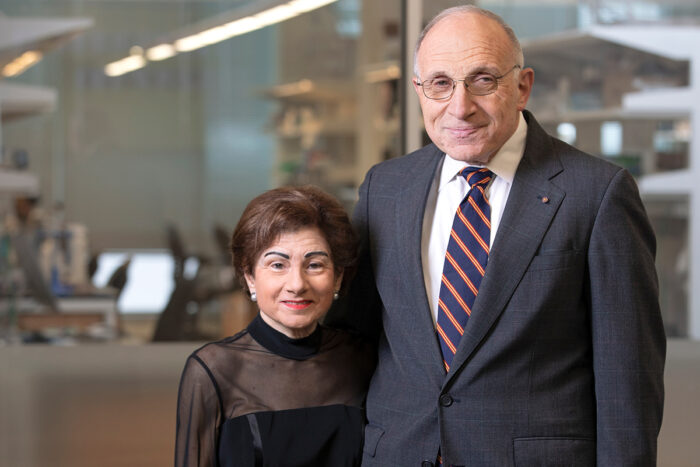Needlemans commit $15 million aimed at therapies for chronic diseases
New centers’ researchers will target chronic diseases of aging
 Matt Miller
Matt MillerSima and Philip Needleman have committed $15 million to two newly created centers at Washington University School of Medicine dedicated to advancing promising areas of research into chronic diseases of aging. The new centers are the Philip and Sima Needleman Center for Autophagy Therapeutics and Research, and the Philip and Sima Needleman Center for Neurometabolism and Axonal Therapeutics.
Washington University School of Medicine in St. Louis has received a $15 million commitment from longtime benefactors Philip and Sima Needleman to support two cutting-edge research centers aimed at developing new treatments for diseases that collectively affect millions. The Needlemans have a long relationship with the university; Philip served as head of the former Department of Pharmacology, and Sima, a social worker, worked at the former Jewish Hospital of St. Louis and has been a key volunteer leader at the Brown School.
Of the gift, $10 million will fund the newly established Philip and Sima Needleman Center for Autophagy Therapeutics and Research, and $5 million will fund the new Philip and Sima Needleman Center for Neurometabolism and Axonal Therapeutics.
The gift will help to advance promising research in two major areas of medical science. One center will focus on understanding autophagy, a vital cellular waste recycling system that has been implicated in many processes that affect health, including aging, infections, inflammatory diseases, obesity, diabetes, atherosclerosis and cancer.
A second center will focus on the metabolism of neurons — how they burn energy — and how that impacts the health of the nervous system. Because energy metabolism is central to all cells, the center’s researchers will investigate its potential in developing therapeutics for diseases as diverse as Parkinson’s disease, hearing loss, traumatic brain injury, glaucoma, antibiotic-resistant infections and certain genetic disorders.
“We are grateful to Sima and Phil Needleman for their extraordinary generosity in supporting cutting-edge medical research,” said Chancellor Mark S. Wrighton. “These new centers will help harness the collective research excellence already underway in these areas across the School of Medicine and provide new avenues for collaboration and entrepreneurship related to the development of new therapeutics. These two centers are poised to make major contributions to human health, including potentially slowing the effects of aging.”
David H. Perlmutter, MD, executive vice chancellor for medical affairs and the George and Carol Bauer Dean of the School of Medicine, will lead the autophagy center along with founding members Thaddeus Stappenbeck, MD, PhD, the Conan Professor of Laboratory and Genomic Medicine; Gary Silverman, MD, PhD, the Harriet B. Spoehrer Professor of Pediatrics and head of the Department of Pediatrics; David M. Holtzman, MD, the Andrew B. and Gretchen P. Jones Professor and head of the Department of Neurology; Marco Colonna, MD, the Robert Rock Belliveau, MD Professor of Pathology; and Christina L. Stallings, PhD, an associate professor of molecular microbiology.
The neurometabolism and axonal therapeutics center will be co-led by Aaron DiAntonio, MD, PhD, the Alan A. and Edith L. Wolff Professor of Developmental Biology; and Jeffrey D. Milbrandt, MD, PhD, the James S. McDonnell Professor of Genetics, head of the Department of Genetics, and executive director of the McDonnell Genome Institute.
“We would like to express our deepest thanks to Sima and Philip Needleman for this extraordinary gift,” said Perlmutter, who is also the Spencer T. and Ann W. Olin Distinguished Professor. “The fields of autophagy and neurometabolism have exploded in recent years, and Washington University is positioned to have a major impact as a leading institution in these areas. With our leadership in Alzheimer’s disease research, our expertise in immunobiology, the development of animal models and human cell models of disease, our genomic capabilities and our informatics resources, we are designing these centers to bring an ever-expanding team together to accelerate progress toward new treatments with urgency. One of the best things about these centers is that Phil Needleman will be deeply involved and using his brilliance and enthusiasm to push the envelope on everything we are doing.”
Perlmutter likened the protein machinery of autophagy to the vacuum cleaners and recycling systems of cells. When these systems stop working, waste builds up and cells cease to function as they should. Perlmutter’s own research has uncovered the role of autophagy in a genetic disorder called alpha1-antitrypsin deficiency, which can lead to lung and liver diseases. He also is leading efforts to develop drugs that boost autophagy and help cells perform their vital functions.
“We know that autophagy is stimulated by exercise and calorie restriction — the very things we associate with healthy living,” Perlmutter said. “We also know that autophagy declines with aging and is linked to degeneration. We already know of some drugs that stimulate autophagy. With this center, we hope to continue research into understanding this pathway so we can find more drug targets for it. We also hope to continue building partnerships with industry, and support our researchers’ abilities to form their own startup companies surrounding their novel compounds.”
Milbrandt and DiAntonio are leaders in the field of neurometabolism, especially as it relates to the health of axons, the wires of the nervous system that transmit electrical impulses. They recently discovered that when a nerve is injured or diseased, a self-destruction program is initiated that depletes energy levels in axons and triggers axon loss. If this system can be blocked, it may be possible to prevent or treat a variety of neurodegenerative diseases including peripheral neuropathies, which commonly occur in cancer patients after chemotherapy treatments and as a consequence of diabetes.
“These proteins that rapidly deplete the cellular fuel supply make excellent drug targets,” Milbrandt said. “Our new understanding of the proteins that govern neurometabolism could lead to new links among metabolism, inflammation and neurodegeneration.”
Philip Needleman, PhD, has a long and distinguished scientific career that encompasses both academic research as well as pharmaceutical drug development. He came to Washington University in 1964 as a postdoctoral fellow and later joined the faculty of the Department of Pharmacology. He then served as head of the Department of Pharmacology from 1976-89.
While studying the role of hormonelike substances called prostaglandins in arthritis, his lab discovered COX-2, a variation of the cyclooxygenase enzyme responsible for inflammation and pain in arthritis patients. This discovery led to the development of the drug Celebrex, which reduces pain, swelling and inflammation and is used to treat a variety of problems from arthritis, to menstrual pain, to colon cancer. Approved by the FDA in 1998, the blockbuster anti-inflammatory drug has been used by millions of Americans. He also is widely known for his research into the regulation of blood pressure. Needleman and his colleagues discovered the first angiotensin blocker and atrial natriuretic factor, a hormone that ties together heart and kidney function, governing blood pressure by regulating the body’s salt and water metabolism.
Philip Needleman made the switch from academia to industry in 1989, joining Monsanto as chief scientist, where he led the work developing Celebrex. Later, he served as president of Searle Research and Development and then senior executive vice president after Monsanto merged with Pharmacia & Upjohn.
“We are delighted to be able to provide support for these two exciting centers of scientific discovery at Washington University,” said Philip Needleman. “Over the course of my career, I have felt fortunate to have been through the complete drug development process from basic academic research in my lab to the industrial production of a widely used drug. I see these centers as a chance for bright people to see a problem through from beginning to end, and to have the resources to validate a new drug target and have access to the tools to assess whether it will make a good therapeutic compound.
“We want to marry our great academic discoveries to the later processes of making new treatments that will help patients,” he added. “With these resources, along with the wonderful advancements in biomedical science that have been so extraordinary, we can begin to ask questions and find solutions that we could never touch before.”
Sima Needleman earned a master’s degree from the Brown School. She worked as a medical social worker at what was then Jewish Hospital of St. Louis, now Barnes-Jewish Hospital. She began in the obstetrics department and later joined the staff of the in vitro fertilization (IVF) program. Led by Washington University faculty members, the program was the first to successfully perform IVF in Missouri, and Sima Needleman and her colleagues were among the vanguard in their work with IVF patients.
After 16 years at the hospital, she opened a private practice. She went on to serve in several volunteer leadership roles at the Brown School, including as a member of its alumni board and as president from 1993-95. She has served as a member of the Brown School National Council since 1998, continuing as an emerita member since 2013. She was honored with the Dean’s Medal from the Brown School in 2006. Beyond her roles at Washington University, she is known for her dedicated volunteer work in the St. Louis community.
Philip Needleman is a member of the National Academy of Sciences and the National Academy of Medicine. At Washington University, he is an emeritus trustee and chair of the School of Medicine National Council. A five-time recipient of Washington University’s Distinguished Faculty Award, he also has been recognized with the School of Medicine’s Second Century Award and received an honorary doctorate of science in 1999.
For the Needlemans, this gift continues a long history of generous financial support to Washington University, including an endowed professorship, a pharmacology prize, and fellowships in regenerative medicine at the School of Medicine and three endowed scholarships at the Brown School. They are Life Members of the William Greenleaf Eliot Society’s Danforth Circle Chancellor’s Level. In 2011, the couple was honored with the Eliot Society’s “Search” Award for their extraordinary dedication to Washington University.






